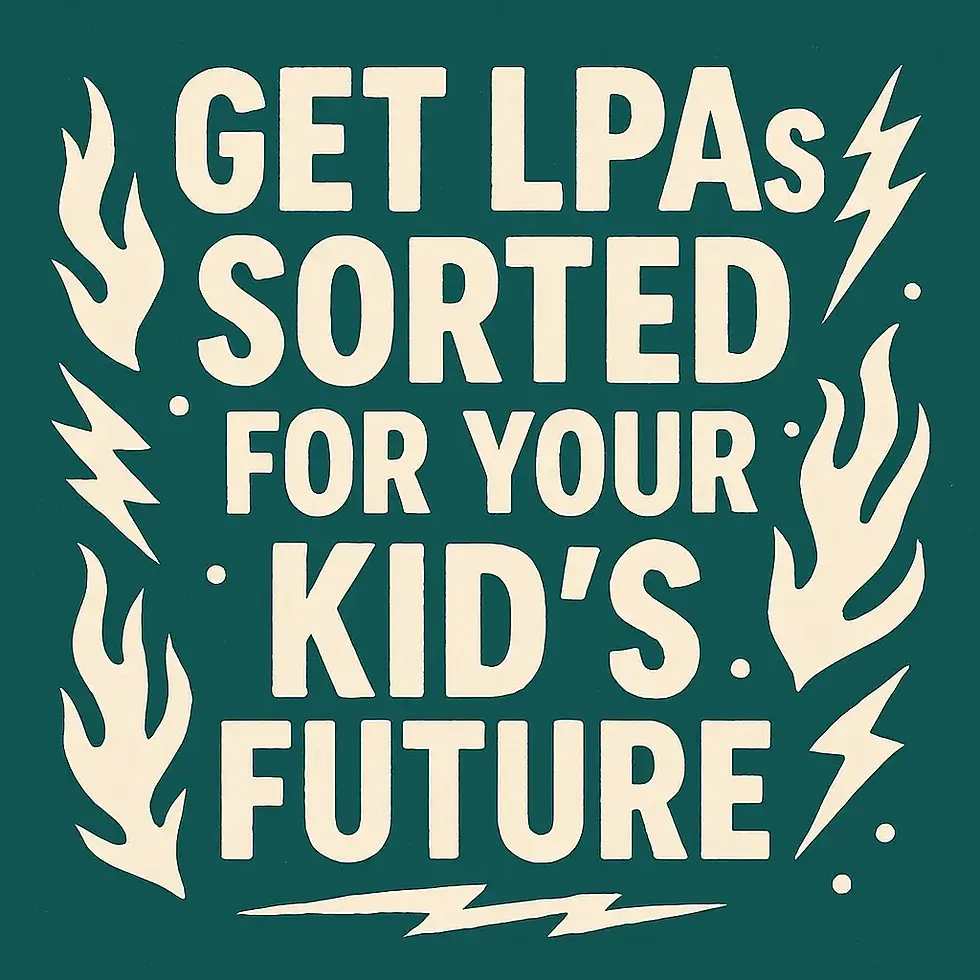Capacity Isn’t All or Nothing — It’s Decision by Decision
The Mental Capacity Act (2005) makes it clear: each choice needs its own assessment and its own report — anything less risks being thrown out and leaves your young person unprotected
Why a capacity check before signing is so important
If your young person has special educational needs (SEN), a learning disability, autism, or any condition that may affect their understanding of complex information, it’s wise—often essential—to get a capacity assessment before signing a Lasting Power of Attorney (LPA).
Under the Mental Capacity Act 2005, an LPA is only valid if the person signing it fully understands what it means, who they are giving power to, and the consequences of that decision. Skipping or rushing this step can lead the Office of the Public Guardian (OPG) to refuse registration of the LPA or result in legal challenges later.
By completing a clear, supportive capacity assessment before signing, you protect your child, ensure the LPA’s validity, and safeguard your right as a parent to remain involved after your child turns 18.
Here’s the good news: when you book your assessment with us, we can also act as the Certificate Provider—confirming your young person understands the LPA and is not under pressure to sign. We provide this service at no extra cost, making the process smoother, safer, and fully recognised by solicitors and the OPG.
Why capacity assessments matter
The Mental Capacity Act 2005 is clear: no one can assume whether a person has or lacks capacity. Capacity depends on the specific decision in front of them. This means each decision requires its own assessment and a separate report.
If your young person is making both types of Lasting Power of Attorney—Property & Finance and Health & Welfare—we can conduct both assessments in one visit for convenience. However, we always produce two distinct reports.
Why? Because managing a bank account is very different from deciding where to live. One might be possible while the other is not. A single, catch-all capacity assessment won’t hold up in court. It risks being rejected, leaving your young person unprotected and you sidelined. Our thorough approach is more work, but it’s the only legally robust way to protect your family’s rights.
Our approach: conversation, not interrogation
Capacity assessments can sound clinical and cold, but with us, they’re anything but. We don’t put your young person under a spotlight and fire rapid questions. Instead, we sit alongside them, talk, listen, and gently check understanding, in their own words and at their own pace.
Our reports are court-ready and fully CPR Part 35 compliant, meaning they’ll stand up to scrutiny from solicitors or the Office of the Public Guardian. But more importantly, the process is therapeutic. It gives your child the dignity of being truly heard, protects them from decisions made “about” them rather than “with” them, and gives you, as a parent, confidence that what matters most has been captured, recorded, and respected.
Getting the paperwork right
Before tribunal, there’s a crucial fight worth having.
When the council issues a flimsy EHCP plan, refuses essential changes, or blocks your child’s support, mediation is your opportunity to make them listen—without waiting months for a tribunal.
What We Do:
-
Assessment Review: In-person or desktop evaluation of your child’s real needs.
-
Gap Analysis: We identify vague wording, missed support, and unlawful shortcuts in the EHCP.
-
Mediation Pack: A sharp, evidence-backed case that councils can’t dismiss.
-
Expert Advocacy: We stand by your side virtually or in person to keep the pressure on the local authority.
Why It Matters:
Mediation can deliver real, fast changes. With our expert preparation and advocacy, mediation stops being a paper exercise and becomes a powerful tool to secure the right support for your child.

Lasting Powers of Attorney
Keeping parents in the room after 18
When your child turns 18, the law flips a switch. Suddenly, you’re told you can’t make decisions for them anymore—not about their health, finances, or even benefits that keep daily life going.
Professionals and agencies start communicating over your head, but you’re still the one holding everything together.
That’s where a Lasting Power of Attorney (LPA) comes in. Only young people aged 18 and over can create an LPA. It’s a legal safeguard that ensures you, as a parent or trusted supporter, continue to have a voice alongside your child in important decisions.

The two types of lasting power of attorney
-
Property & Finance: Manages bills, benefits, bank accounts, and all financial matters.
-
Health & Welfare: Covers medical treatment decisions, care plans, and living arrangements for your young person.
You can set up one or both types of LPA. Either way, it ensures important decisions aren’t left to strangers who don’t know your child.
Our Prices — No Surprises
Clear, fixed fees — all the way to tribunal.

Single LPA Capacity Assessment (Finance or Health):
£496

Dual LPA Capacity Assessment (both in one visit):
£767

Add-on: LPA drafting & document production
£150 for a single LPA
£200 Both
All prices are listed before VAT. If we need to travel to you, we’ll agree travel costs in advance — no hidden extras. For a personalised quote that fits your child’s needs, get in touch with us today.
Our process
Step 1 – Free Call & Personalised Quote
Start with a free, no-obligation call. We’ll discuss your situation, explain your options clearly, and provide a personalised, transparent quote—no jargon, no hidden fees.
Step 2 – Meet Your Qualified Assessor
We’ll match you with a qualified assessor who will arrange a calm, conversational home visit with your young person—now an adult. They’ll assess capacity in line with the Mental Capacity Act 2005.
Because your young person is an adult, we take instructions directly from them about whether they want to complete a Lasting Power of Attorney (LPA) and how it should be drawn up. If they have capacity, we ensure the LPA forms accurately reflect their wishes and are properly completed and signed.
Step 3 – Rigorous Quality Control
Back at our office, we double-check all paperwork, follow up on any missing signatures, and ensure everything is legally watertight.
Step 4 – Submission to the Office of the Public Guardian (OPG)
We handle sending the complete LPA pack to the OPG, saving you the hassle of back-and-forth communications.
Step 5 – OPG Review & Return
When the OPG returns the documents, we perform a final quality check to confirm everything is in order.
Step 6 – Final Dispatch & Peace of Mind
Your completed, legally valid LPAs are sent to you—no mess, no delay, just peace of mind that you’ll continue to have a voice in your young person’s future.

Not Just Talk — Credentials That Count
We’re not a Facebook group or a “well-meaning mate.” We’re fully qualified, regulated professionals — with the badges to prove it.
✔ Member of BASW – British Association of Social Workers
✔ Member of Court of Protection Practitioners Association
✔ Accredited with Financial Vulnerability Taskforce
✔ Trusted SOLLA Affiliate – Society of Later Life Advisers
✔ Registered with Social Care Wales
Every assessment and appeal is handled by experts who know the law, the system, and how to fight your corner — with compassion and clarity.

Not sure where to start? Let's Talk.
Every family’s fight is different. Drop us a message or pick up the phone — we’ll listen, no jargon, no pressure.

%20(1).webp)








